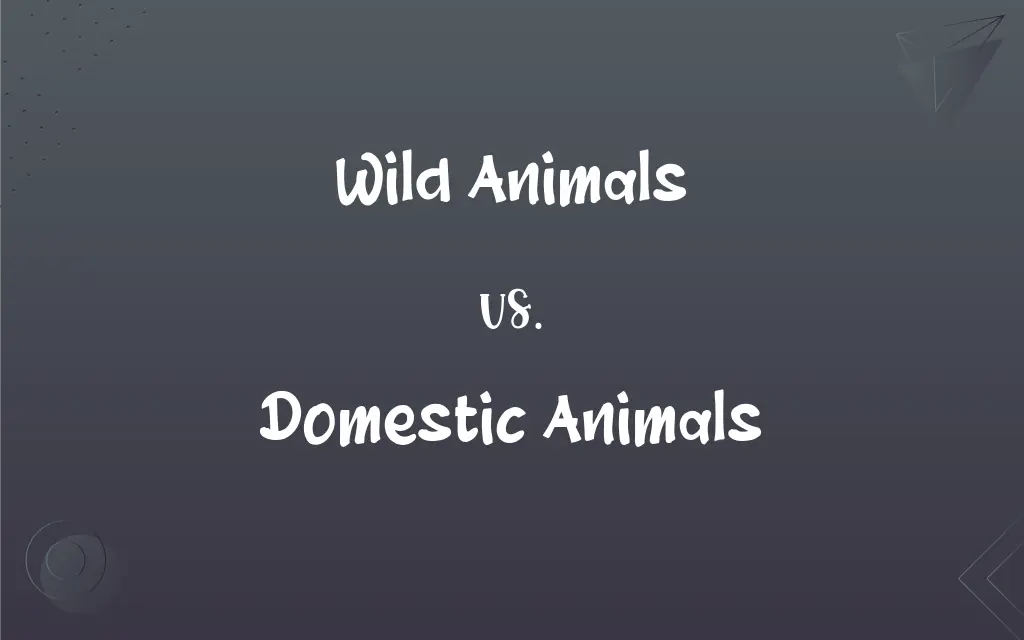Wild Animals vs. Domestic Animals: What's the Difference?
Edited by Aimie Carlson || By Janet White || Published on January 29, 2024
Wild animals live and breed in natural habitats without human intervention, while domestic animals are bred and raised under human care for various purposes.

Key Differences
Wild animals are species that live and sustain themselves in natural environments without human support or intervention. Domestic animals, however, have been bred and raised under human care, often for specific roles like companionship, labor, or food.
The behavior of wild animals is primarily driven by natural instincts essential for survival, such as hunting or foraging for food. Domestic animals, conversely, have behaviors shaped by human training and breeding, often reducing their reliance on survival instincts.
In terms of adaptability, wild animals are equipped to survive in specific ecosystems with natural predators and prey. Domestic animals have adapted to living alongside humans, often losing some of their natural survival capabilities.
Genetically, wild animals maintain the diversity inherent to their species, evolving through natural selection. Domestic animals have undergone selective breeding, leading to traits desirable for human use, sometimes at the cost of genetic diversity.
Wild animals typically avoid human contact and can display natural fear or aggression towards humans. Domestic animals, especially pets, show affinity and dependence on humans, having been socialized to live in human environments.
ADVERTISEMENT
Comparison Chart
Natural Habitat
Live in natural environments
Raised under human care
Behavior
Driven by natural survival instincts
Shaped by human training and breeding
Adaptability
Adapted to specific ecosystems
Adapted to living with humans
Genetics
Maintain natural genetic diversity
Undergo selective breeding
Interaction with Humans
Typically avoid human contact
Often show affinity and dependence on humans
ADVERTISEMENT
Wild Animals and Domestic Animals Definitions
Wild Animals
Animals that live freely in natural habitats.
Lions are wild animals thriving in the African savannah.
Domestic Animals
Species dependent on humans for care and sustenance.
Chickens, as domestic animals, are raised for eggs and meat.
Wild Animals
Animals sustaining themselves without human aid.
Eagles are wild animals that hunt for their food.
Domestic Animals
Species adapted to living alongside humans.
Cattle are domestic animals used in agriculture.
Wild Animals
Species that evolve through natural selection.
The diverse bird species in the rainforest are wild animals.
Domestic Animals
Animals bred and raised in human-controlled environments.
Dogs have been domestic animals for thousands of years.
Wild Animals
Animals with natural behaviors unaltered by humans.
The wild animals in the national park display natural behaviors.
Domestic Animals
Animals with behaviors influenced by human training.
Domestic animals like horses can be trained for various tasks.
Wild Animals
Species not domesticated or controlled by humans.
Wolves are wild animals with strong survival instincts.
Domestic Animals
Animals selectively bred for specific traits.
Sheep are domestic animals bred for their wool.
Wild Animals
Plural of wild-animal
FAQs
What defines a wild animal?
Animals living independently in natural habitats without human domestication.
What are domestic animals?
Animals bred and raised under human care, often for specific purposes.
Do domestic animals retain natural instincts?
To some extent, but these are often diminished compared to wild counterparts.
How do wild animals find food?
Through natural behaviors like hunting or foraging.
What's an example of a domestic animal?
Examples include dogs, cats, and farm animals like cows and chickens.
Can domestic animals contribute to ecosystems?
They mainly contribute to human-managed ecosystems like agriculture.
How do humans interact with domestic animals?
Through care, training, and use for labor, companionship, or food.
Can wild animals become domesticated?
Rarely; domestication is a process that occurs over many generations.
Do wild animals have natural predators?
Yes, they are part of natural ecosystems with predators and prey.
Are all pets considered domestic animals?
Yes, pets are a type of domestic animal.
Why can't some domestic animals be released into the wild?
They lack the necessary survival skills and adaptations for wild environments.
What are the challenges in conserving wild animals?
Habitat loss, poaching, and climate change are significant challenges.
Do wild animals adapt to urban environments?
Some can adapt to urban settings, but this often leads to conflicts with humans.
How do wild animals contribute to biodiversity?
By maintaining healthy ecosystems and genetic diversity.
What role do domestic animals play in human societies?
They serve roles in agriculture, companionship, service, and more.
Can domestic animals survive in the wild?
It's challenging as they have adapted to human care and might lack survival skills.
Is wildlife conservation important?
Yes, to preserve the natural habitats and populations of wild animals.
Are there laws protecting wild animals?
Yes, many countries have laws and regulations for wildlife protection.
How are domestic animals different in behavior?
They are often more docile and dependent on humans due to selective breeding.
How long does domestication take?
It typically takes many generations over hundreds or thousands of years.
About Author
Written by
Janet WhiteJanet White has been an esteemed writer and blogger for Difference Wiki. Holding a Master's degree in Science and Medical Journalism from the prestigious Boston University, she has consistently demonstrated her expertise and passion for her field. When she's not immersed in her work, Janet relishes her time exercising, delving into a good book, and cherishing moments with friends and family.
Edited by
Aimie CarlsonAimie Carlson, holding a master's degree in English literature, is a fervent English language enthusiast. She lends her writing talents to Difference Wiki, a prominent website that specializes in comparisons, offering readers insightful analyses that both captivate and inform.































































